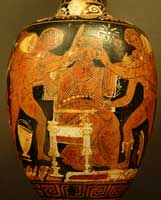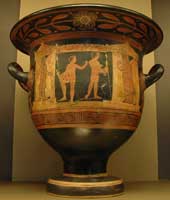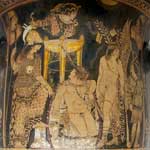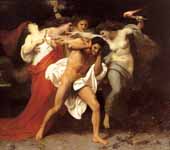.
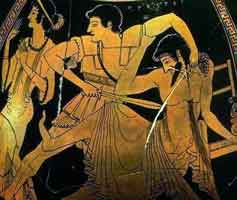
Orestes slaying Aegisthus while his mother Klytaemnestra looks away
Orestês (Ὀρέστης, Ορέστης), in Greek legend, was the son of Agamemnon and Clytemnestra.
According to the Homeric story Orestes was absent from Mycenae when his father returned from the Trojan War and was murdered by his wife's lover Aegisthus. Eight years later Orestes returned from Athens and avenged his father's death by slaying his mother, and her paramour. According to Pindar,he was saved by his nurse (Arsinoe) or his sister, Electra, who conveyed him out of the country when Clytemnestra wished to kill him. He escaped to Phanote on Mount Parnassus, where King Strophius took charge of him.
In his twentieth year he was ordered by the Delphic oracle to return home and avenge his father's death. He returned home along with his friend Pylades, Strophius's son. According to Aeschylus, he met his sister Electra before the tomb of Agamemnon, where both had gone to perform rites to the dead; a recognition takes place, and they arrange how Orestes shall accomplish his revenge. The same basic story is told differently by Sophocles and Euripides in their Electra plays.
In Aeschylus's Eumenides, Orestes, after the deed (sometimes with Electra helping), goes mad, and is pursued by the Erinyes (Electra is not hounded by the Erinyes), whose duty it is to punish any violation of the ties of family piety. He takes refuge in the temple at Delphi; but, even though Apollo had ordered him to do the deed, he is powerless to protect Orestes from the consequences. At last Athena receives him on the acropolis of Athens and arranges a formal trial of the case before twelve Attic judges. The Erinyes demand their victim; he pleads the orders of Apollo; the votes of the judges are equally divided, and Athena gives her casting vote for acquittal. The Erinyes are propitiated by a new ritual, in which they are worshipped as Eumenides, and Orestes dedicates an altar to Athena Areia.
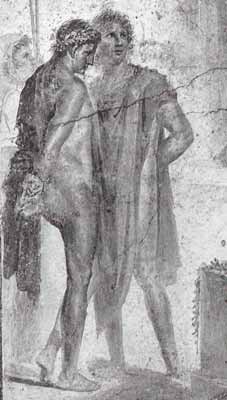
Orestes and Pylades bound
With Aeschylus the punishment ends here, but, according to Euripides, in order to escape the persecutions of the Erinyes, he was ordered by Apollo to go to Tauris, carry off the statue of Artemis which had fallen from heaven, and bring it to Athens. He repairs to Tauris with Pylades, and the pair are at once imprisoned by the people, among whom the custom is to sacrifice all strangers to Artemis. The priestess of Artemis, whose duty it is to perform the sacrifice, is his sister Iphigenia. She offers to release Orestes if he will carry home a letter from her to Greece; he refuses to go, but bids Pylades take the letter while he himself will stay and be slain. After a conflict of mutual affection, Pylades at last yields, but the letter brings about a recognition between brother and sister, and all three escape together, carrying with them the image of Artemis. After his return to Greece, Orestes took possession of his father's kingdom of Mycenae (killing Aegisthus' son, Alete), to which were added Argos and Laconia. He is said to have died of the bite of a snake in Arcadia. His body was conveyed to Sparta for burial (where he was the object of a cult), or, according to an Italian legend, to Aricia, whence it was removed to Rome (Servius on Aeneid, ii. 116)
Before the Trojan War, Orestes had been engaged to his cousin through Menelaus, Hermione. Afterwards, Menelaus wanted her to marry Neoptolemus. Orestes and Neoptolemus fought, and Neoptolemus was killed. Marrying Hermione and seizing Argos and Arcadia after their thrones had become vacant, Orestes became ruler of all the Peloponnesus. His son, Tisamenus, was later killed by the Heracleidae.
The story of Orestes was the subject of the Oresteia of Aeschylus (Agamemnon, Choephori, Eumenides), of the Electra of Sophocles, of the Electra, Iphigeneia in Tauris, and Orestes, of Euripides. There is extant a Latin epic poem, consisting of about 1000 hexameters, called Orestes Tragoedia, which has been ascribed to Dracontius of Carthage.
Orestes appears also as a central figure in various legends connected with his madness and purification, both in Greece and Asia. In these Orestes is the guilt-laden mortal who is purified from his sin by the grace of the gods, whose merciful justice is shown to all persons whose crime is mitigated by extenuating circumstances. These legends belong to an age when higher ideas of law and of social duty were being established; the implacable blood-feud of primitive society gives place to a fair trial, and in Athens, when the votes of the judges are evenly divided, mercy prevails.
In one version of the story of Telephus, Orestes was held captive by King Telephus, demanding that Achilles heal him.
According to some sources, Orestes fathered Penthilus by his half-sister, Erigone.

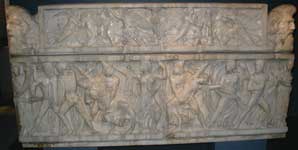
Oresteia, Sarcophag, Walters Art Museum
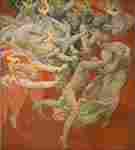
Orestes Pursued by the Furies, John Singer Sargent
Orestes and Pylades Disputing at the Altar, Pieter Lastman
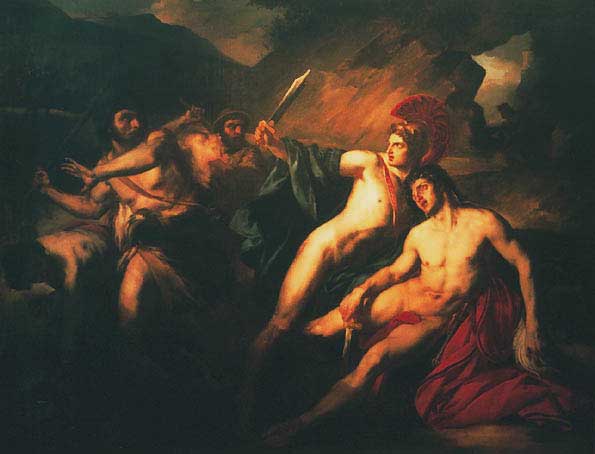
Pylades und Orestes , Francois Bouchot (1800 Paris -1842 Paris)
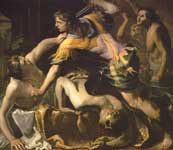
Orestes slaying Aegisthus and Clytemnestra, Bernardino Mei
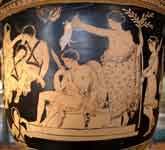
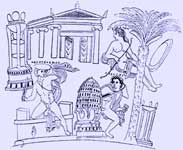
Apollo, Neoptolemus and Orestes in Delphi, The Apollo Temple , tripods and the Omphalos. From a Volute-Crater, Iliupersis Painter, c. 380 BC (See Neoptolemus)
Agamemnonides (Ἀγαμεμνονίδης). A patronymic applied to Oreste sas the son of Agamemnon
Music
Iannis Xenakis (May 29, 1922 Romania - February 4, 2001) Oresteïa (1965-1966), on texts from Aeschylos, suite for children's choir, mixed choir with musical accessories and ensemble of 12 musicians
See also : Greek Mythology. Paintings, Drawings
| Ancient Greece
Science, Technology , Medicine , Warfare, , Biographies , Life , Cities/Places/Maps , Arts , Literature , Philosophy ,Olympics, Mythology , History , Images Medieval Greece / Byzantine Empire Science, Technology, Arts, , Warfare , Literature, Biographies, Icons, History Modern Greece Cities, Islands, Regions, Fauna/Flora ,Biographies , History , Warfare, Science/Technology, Literature, Music , Arts , Film/Actors , Sport , Fashion --- |
Retrieved from "http://en.wikipedia.org"
All text is available under the terms of the GNU Free Documentation License

